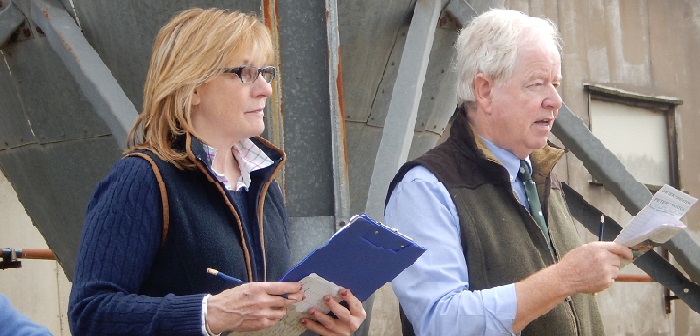Although the SPP only fell by 0.49p to 164.17p, spot sellers found they were in a distinctly colder climate, with most buyers already ‘full’ with pigs from regulars and, as a result, one off loads of spot pigs proved much harder to sell than they were a few weeks ago.
On a more positive note, however, German producer prices have remained at similar levels, but imports are still posing a significant threat to the domestic market.
Weekly announced contribution prices have eased to the tune of a copper or three, with most between 156p and 163p/kg. Where there was any room for spot bacon, prices tended to be in the 160p/kg region for ‘regulars’, but one off spot loads were several pence below this.
Unfortunately, the fallout from the recent fire at Brechin Abattoir is still putting more pigs south of the border and not helping as far as the ‘north/south’ divide is concerned.
Cull sow prices are continuing to benefit from a relatively strong Euro, which traded on Friday slightly easier worth 91.6p, but cull sow quotes have also remained at ‘stand on’ levels, mainly within the 96p – 98p/kg range, according to load size.
Although the latest AHDB weaner averages have improved on the week, with ex-farm 30kg weaners up by £2.11/head to £60.70/head and 7kg weaners up by £0.65/head to £44.90/head, space for spot weaners has proved to be scarce with the result that prices in this sector have eased significantly.
Grain prices ended a relatively quiet week with ex-farm spot wheat quoted at £131/t and UK feed wheat futures traded at slightly higher levels, despite falls in the international grain futures markets due to the weakening value of Sterling against the Euro and the US Dollar.
November feed wheat traded on the LIFFE market a shade firmer at £141.25/t and May 2018 is also up a touch at £147.25/t.
UK protein prices have remained at generally similar levels with late August 48% soyameal traded at £295/t and 34% rape meal at £64/t.
And finally, African Swine Fever (ASF) continues to move in a westerly direction with further discoveries in the Czech Republic, where more than 100 cases have been reported, and in Romania.
For those of you who can remember their geography lessons, Germany borders the Czech Republic and could be the next country in the firing line.
For all these reasons, the UK needs to keep a very firm grip on the trade in live pig imports as well as pigmeat products, as the last thing that our industry can afford is another battle with ASF or FMD, especially at a time when it looks as though compensation payments may be cut significantly and clean up costs could end up in the farmer’s lap.




